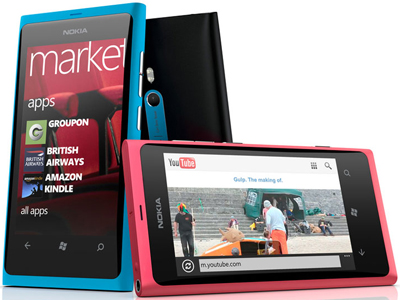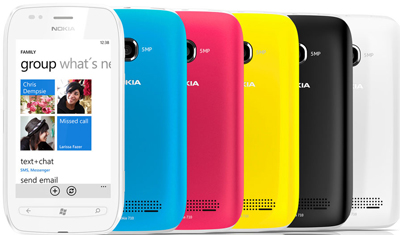News
The Nokia Era Begins for Windows Phone
- By Scott Bekker
- October 26, 2011
Nokia introduced its first two Windows Phones on Wednesday -- the Nokia Lumia 800 and the Nokia Lumia 710.
The two handsets, unveiled at Nokia World 2011 in London, mark the tangible form of two risky bets. One is Nokia CEO Stephen Elop's company-risking bet that Nokia can survive by switching from the proprietary Symbian smartphone OS to Microsoft's Windows Phone OS.
"Eight months ago, we shared our new strategy and today we are demonstrating clear progress of this strategy in action," Elop, a former senior Microsoft executive, said Wednesday in a reference to Nokia's controversial announcement of the Windows Phone-first strategy.
The other bet is Microsoft CEO Steve Ballmer's major investment in Nokia in the hopes that the Scandanavian phonemaker can retain and convert enough of its global Symbian market share to make Windows Phone competitive with smartphones based on Google Android and the Apple iPhone.
"The third ecosystem is alive and well, due in part to Nokia's partnership and commitment to delivering amazing new Windows Phones to consumers around the world," Andy Lees, president of the Windows Phone Division at Microsoft, enthused in a statement accompanying the Nokia phone releases.
The emphasis is on global -- as in, not including the critical U.S. market -- initially. The Nokia Lumia 800 is scheduled to roll out in November to six European countries: France, Germany, Italy, the Netherlands, Spain and the United Kingdom. Hong Kong, India, Russia, Singapore and Taiwan are scheduled to get that phone before the end of the year.

|
| Nokia Lumia 800 |
Nokia's Lumia 710 will first be available toward the end of the year in Hong Kong, India, Russia, Singapore and Taiwan.
While the company committed to expand availability to further markets in 2012, it wasn't clear if the two smartphones would come to the United States at that point or if Nokia would be rolling out different devices for U.S. users. In a statement, the company said it planned "to introduce a portfolio of products into the U.S. in early 2012 and into mainland China in the first half of 2012."

|
| Nokia Lumia 710 |
Both new phones run the Windows Phone 7.5, or "Mango," operating system that became generally available in late September. Other attributes shared by the two devices include:
- A 1.4 GHz Snapdragon/Scorpion processor.
- An 800x480 pixel screen resolution.
- A 3.7-inch ClearBlack display.
- Nokia-developed software, including Nokia Drive for turn-by-turn navigation and Nokia Music with radio-style mobile music streaming and a tool for finding local live music.
- The absence of a front-facing camera, which is especially notable in light of Microsoft's recent completion of the Skype acquisition.
- The lack of near field communication (NFC) capabilities.
The Lumia 800 stands apart from the Lumia 710 on the camera, storage and battery life. The 800 has an 8-megapixel camera with Carl Zeiss Optics, compared with the 5-megapixel camera in the 710. The Lumia 800 also sports 16 GB of internal user memory, while the Lumia 710 has only 8 GB. Both phones came under immediate criticism on comment boards for the low storage totals, which compare poorly to the 64 GB maximum on the new Apple iPhone 4S. Nokia does note that both devices come with 25 GB of free storage space on SkyDrive.
Comparing the Lumia 800 and Lumia 710 on listed battery life, the 800 has substantially longer talk times on GSM (13 hours to 6.9 hours) and WCDMA (9.5 hours to 7.6 hours) and longer music playback times (55 hours to 38 hours), while the 710 has longer standby times on GSM (400 hours to 265 hours) and WCDMA (400 hours to 335 hours).
The Lumia 710's big advantage is on price, with an estimated retail price of 270 Euros (about $375) compared with the Lumia 800's 420 Euros ($585).
In appearance, the Lumia 800 is a little smaller with its sleeker, curved display, and comes in cyan, magenta or black. The Lumia 710, which is slightly lighter, is available in black and white with removable back covers available in black, white, cyan, fuchsia and yellow.
About the Author
Scott Bekker is editor in chief of Redmond Channel Partner magazine.